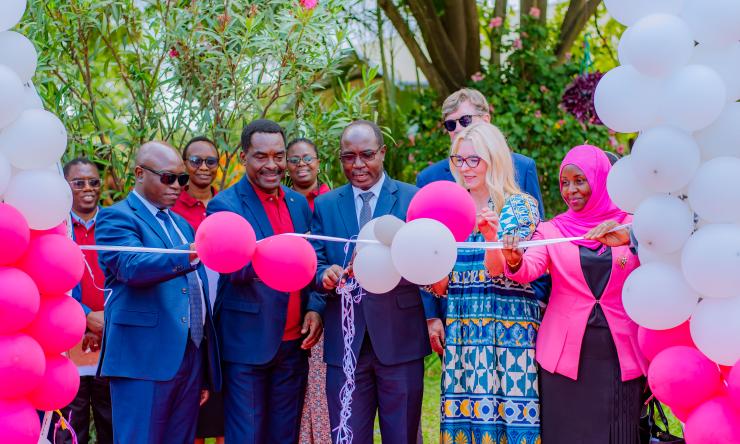Bristol Myers Squibb Foundation, Texas Children’s Global HOPE, & Baylor College of Medicine Global Health launch program to combat sickle cell disease in Sub-Saharan Africa
Texas Children’s Global HOPE and Baylor College of Medicine Global Health, with support from the Bristol Myers Squibb Foundation, an independent charitable organization, announced the next front in their joint efforts to dramatically improve children’s health in Sub-Saharan Africa with the launch of a groundbreaking program to address one of the most urgent threats facing the region: sickle cell disease (SCD).
Sickle cell disease is a lifelong, inherited disorder affecting red blood cells and is one of the leading causes of childhood illness and death in sub-Saharan Africa. It is characterized by lifelong anemia, bone-crushing pain episodes that last for days or weeks, disability from brain strokes in childhood, and early childhood death from infections. In 2023, an estimated 7.7 million people were living with SCD, with more than 80% residing in sub-Saharan Africa. The three organizations are initially launching their joint programs in Tanzania and Uganda.
In Tanzania, Texas Children’s Global HOPE Program and Baylor College of Medicine Global Health, backed by funding from the Bristol Myers Squibb Foundation, will collaborate with Baylor College of Medicine Children’s Foundation – Tanzania, Bugando Medical Centre, Muhimbili University of Health and Allied Sciences, and the Ministry of Health on the Sickle Cell Access and Lifelong Care Program (SCALE). SCALE is designed to improve the survival and quality of life for children living with sickle cell disease through early screening, infection prevention and accessible treatment.
In Uganda, starting in Kayunga, a mostly rural region, a new program led by the Ministry of Health unites Texas Children’s Global HOPE, Baylor College of Medicine Global Health and the Bristol Myers Squibb Foundation with Baylor College of Medicine Children’s Foundation-Uganda, Uganda National Health Laboratory and Diagnostic Services (UNHLDS), Makerere University, Uganda Pediatric Association and Mulago National Referral Hospital to integrate SCD care in primary health services.
The initiative, in partnership with the Africa CDC, is part of a phased approach for a broader pan-African program. With a focus on building local healthcare capacity, the program will integrate three essential lifesaving SCD interventions into primary care services: (1) screening all infants for SCD at birth or vaccination visits, (2) administering timely childhood vaccinations and penicillin to prevent fatal infections, and (3) supplying hydroxyurea, a drug that reduces sickling of blood cells to prevent complications of SCD. The program also will train local health workers and supplement medical supplies to help provide sustainable, long-term care.
This program marks the next phase of a 25-year partnership between Baylor College of Medicine Global Health, Texas Children’s Global Health and the Bristol Myers Squibb Foundation in the region that has been transformational for children’s health. In 1999, these partners launched a response to HIV/AIDS at the height of the epidemic, providing care for more than 396,000 mothers and children across the region. Their efforts helped transform pediatric HIV and AIDS from an acute health crisis to a manageable chronic disease in some countries through improved healthcare system capacity, training tens of thousands of local healthcare workers, and establishing independent foundations that operate in partnership with governments to deliver care. Texas Children’s leveraged these partnerships and launched the Global HOPE Program in 2016 to address the suffering and mortality of children with cancer, sickle cell disease and other blood diseases in Africa and similar underserved regions around the world.
Since 2016, Texas Children’s Global HOPE Program has trained 35 pediatric cancer and blood disease specialist doctors and 180 pediatric cancer nurses across east and southern Africa. These teams provide specialist care for about 2,500 children diagnosed with cancer every year at 12 tertiary centers in eight countries. They have treated more than 26,000 children with cancer, SCD and blood disorders to date. The dramatic improvement these African pediatric hematologists are making for children with SCD by providing basic medical interventions at tertiary centers reveals the neglect for the many more children with SCD that never make it to large city hospitals in Africa. These African specialists, in collaboration with Global HOPE, have concluded that a public health strategy for controlling SCD in Africa is urgently needed.
“In response to the outcry by the public and Ministries of Health to address sickle cell disease in Africa, together with colleagues and partners in Africa we have resolved to depart from the status quo by integrating interventions into the existing primary health systems to rapidly scale-up, save resources, and lives,” said Dr. Joseph Lubega, associate professor at Baylor College of Medicine and director of Texas Children’s Global HOPE Program. “This is the beginning of bringing an end to thousands of years of intolerable pain, disability and tragic deaths because of sickle cell disease across Africa. These children and families cannot wait any longer.”
“Families in Sub-Saharan Africa know the devastating impact of sickle cell disease all too well,” said Catharine Grimes, president of the Bristol Myers Squibb Foundation. “For people living outside of major urban centers, finding care is a significant challenge and sometimes not even possible. Our new initiative will integrate lifesaving early-stage interventions into primary care facilities in non-urban areas. Leveraging the infrastructure and local healthcare capacity we have already built to address previous urgent crises like HIV/AIDS, we are focused on empowering local health workers to provide sustainable, long-term care. The Bristol Myers Squibb Foundation is proud to be working in partnership with these local health care professionals to turn the tide against this dire public health threat and deliver a brighter, healthier future for families around the region."











